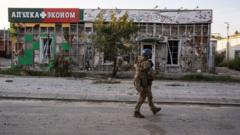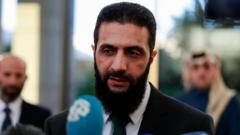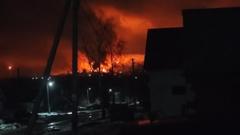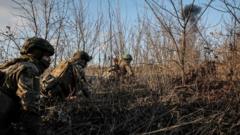A significant number of Russian veterans return home from the Ukraine conflict bearing visible injuries and emotional trauma. As rehabilitation efforts buckle under societal stigma and government hurdles, these men rely on struggling systems to support their recovery.**
The Unseen Battle: Russian Veterans Confront Post-War Challenges**

The Unseen Battle: Russian Veterans Confront Post-War Challenges**
Returning soldiers face a daunting recovery journey filled with both physical and psychological scars.**
Aleksandr, a 38-year-old Russian veteran, spent just two weeks training before being thrust into combat in Ukraine in the summer of 2023. A month later, he lost his left leg to a landmine, and the road to recovery has proven to be a long and painful process. While undergoing adjustments to his prosthetic leg at a sanitarium near Moscow, he reflected on his new reality, stating, "There was a lot of pain at the beginning... eventually, your brain just rewires itself and you get used to it."
Aleksandr's story is emblematic of the struggles faced by the hundreds of thousands of soldiers returning from years of conflict, grappling not only with physical injuries but also the emotional fallout that comes with war. Estimates suggest there are at least 300,000 severely injured veterans, a number reported by independent media sources like Mediazona and Meduza, in addition to the BBC. This figure may be even higher given the recent challenges in obtaining transparent statistics from the government, which has classified many injury data reports.
The societal response to these veterans is multifaceted, as families cope with long waits and the uncertain nature of their loved ones' return home. Many families face the daunting task of reintegrating these highly changed individuals back into everyday life. The condition of veterans ranges from visible injuries, like missing limbs, to less apparent ailments such as post-traumatic stress disorder (PTSD), which often eludes public acknowledgment and stigma.
Another veteran, nicknamed Dima from Kursk, suffers from paralysis caused by shrapnel. He too, like many others, relies on services from facilities like the Rus Sanitarium, where rehabilitative measures include hydro massages and psychological support. In a country grappling with sanctions and resource limitations, the social infrastructure struggles to support veterans adequately.
As the crisis in Ukraine continues, communities and institutions must navigate the complex realities faced by returning soldiers. The veterans of this conflict represent a growing need for a compassionate society, willing to provide the support, care, and understanding critical for their healing journey.





















